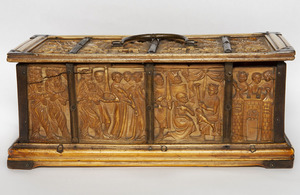Extremely rare 700 year old ivory casket at risk of leaving the UK
A temporary export bar has been placed on a French Gothic ivory casket

- Export bar is to allow time for a UK gallery or institution to acquire the piece
A French Gothic ivory casket worth more than £1.5 million is at risk of leaving the UK unless a buyer can be found to save it for the nation.
The casket is one of just nine known 14th century French composite caskets that depict scenes from mediaeval romance tales. It includes a detailed and early depiction of wild men, mythical creatures appearing in mediaeval European art and literature that symbolise people living outside ‘civilised’ society. The casket shows them assaulting a castle in a rare variation on the popular theme of the storming of the Castle of Love.
The Castle of Love was a commonly depicted scene on secular ivories in the 14th century in which women and girls are shown defending a castle attacked by knights. The scene was so popular at the time that there are records of re-enactments where castles were built and defended by women and girls of the town while men attacked them with fruits and flowers.
On the lid of this casket, wild men and knights are shown engaged in a battle for the castle and its female occupants. Meanwhile the back panel depicts the outcome: a victorious knight kneeling in front of a king with a procession of knights and ladies leading the captured wild men in chains.
Arts Minister Lord Parkinson of Whitley Bay said:
This incredibly rare French ivory casket shows romantic and chivalric scenes as fascinating today as they were seven centuries ago.
I sincerely hope a buyer comes forward so that we might continue to learn more about this remarkable casket and its long history in the UK.
The Minister’s decision follows the advice of the Reviewing Committee on the Export of Works of Art and Objects of Cultural Interest. The Committee noted that the casket is exceptional and enlarges the collection of ivory caskets, particularly given the important secular iconography of the wild men.
Committee member Stuart Lochhead said:
This French 14th-century carved ivory casket is adorned with scenes of chivalry and romance including depictions of wild men – ranging from the rescue of a lady from one such assailant to a procession of knights and ladies who lead the captured wild men in chains. Similar iconography exists on some of the other nine known mediaeval caskets of this type, but it is the present one that illustrates some of the earliest and rarest type of images.
Furthermore, its provenance indicates that it was continuously owned by the same family in Scotland for about four hundred years which is a remarkable and significant provenance for a mediaeval object.
The casket is an exciting addition to a rare group of secular mediaeval ivory carvings, and with a long history of Scottish ownership that needs further in-depth research, its loss to an overseas buyer would be very regrettable.
The Committee made its recommendation on the grounds that the casket met the third Waverley criterion for the study of provenance and the history of early collecting in Britain, and of secular mediaeval art.
The decision on the export licence application for the ivory casket will be deferred for an initial period ending on 1 March 2023 inclusive. At the end of the first deferral period owners will have a consideration period of 15 business days to consider any offer(s) to purchase the casket at the recommended price of £1,506,000. The second deferral period will commence following the signing of an Option Agreement and will last for four months.
ENDS
Notes to editors
- Under the Ivory Act 2018, it is illegal to deal in items containing or made of elephant ivory, unless they are registered as exempt or certified as exempt, on the basis that they are pre-1918 and of outstandingly high artistic, cultural or historical value. An exemption certificate has been obtained for this piece.
- Organisations or individuals interested in purchasing the casket should contact the RCEWA on 0161 934 4317.
- Provenance: In the possession of Thomas Baird, son of Gilbert Baird (1551-1620) of Auchmedden and Franciscan friar at Besançon (France), at some point after 1609 (?); by 1857, in the possession of W.N. Fraser (1817-1899) of Tornaveen House, Aberdeenshire; sold as property from Tornaveen House by Lyon & Turnbull, Edinburgh, 20th May 2021, lot 493.
- The Reviewing Committee on the Export of Works of Art and Objects of Cultural Interest is an independent body, serviced by the Arts Council (ACE), which advises the Secretary of State for Digital, Culture, Media and Sport on whether a cultural object, intended for export, is of national importance under specified criteria.
- Arts Council England is the national development agency for creativity and culture. They have set out in their strategic vision in Let’s Create that by 2030 they want England to be a country in which everyone’s creativity is valued and given the chance to flourish and where everyone has access to a remarkable range of high-quality cultural experiences. ACE invest public money from the Government and The National Lottery to help support the sector and to deliver this vision.